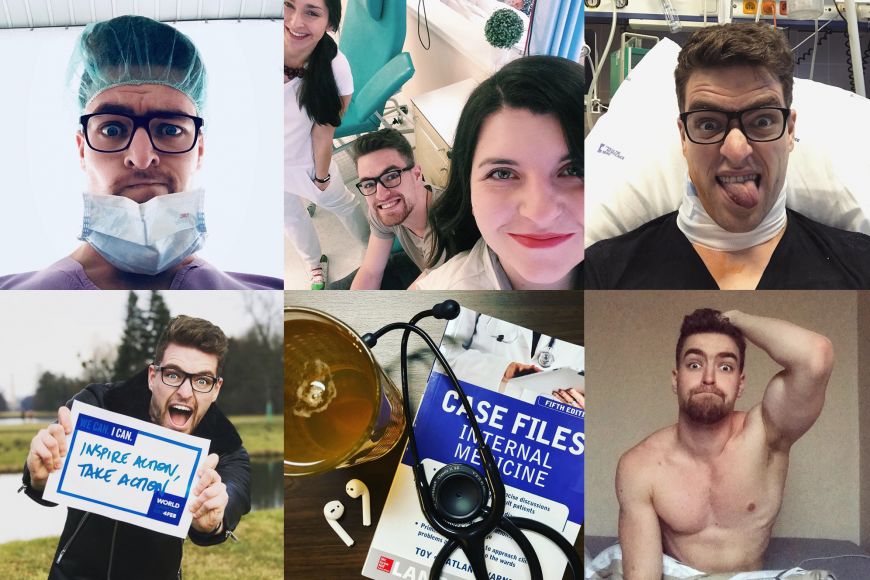David Dufek, a young med student at the MU Faculty of Medicine who dreams of one day becoming an oncologist, has recently been forced to gain unenviable experience in his field of choice after being diagnosed with a malignant tumour in one of his lymph nodes.
However, the future doctor did not lose heart with this diagnosis: not only has he faced up to the challenge, but he actively dismantles many of the myths surrounding cancer by sharing his story online.
The symptoms of the insidious disease crept up over time. “Last autumn, I suddenly started sweating in my sleep. Then I became extremely tired and languid. I thought this was caused by the stress from my studies and my recent return from a study stay in Oxford. However, some time later, I found a lump in my neck. I began to lose weight and I had a raised temperature,” describes David.
Eventually, an appointment with a specialist was inevitable. “I had several examinations shortly before Christmas and the results showed there was clearly something wrong. I had my neck lymph node removed and examined at the beginning of January. I knew right from the start that it was lymphoma; the symptoms were textbook,” he says.
After he shared his diagnosis on his “ddjourney” Instagram profile (also in english), which has several thousand followers, he received numerous inquiries about his health and the treatment process. In David’s opinion, “When you say ‘cancer’, most people imagine that you lose your hair, you feel awful, and that the whole disease is a disaster. The same goes for chemotherapy. A large part of the public is under the false impression that it is pushed by pharmaceutical companies for profit.”
For this reason, he decided to show everyone that there are a number of half-truths and myths about cancer treatment that need to be taken with a pinch of salt. “I find it comical that a lot of us think chemotherapy is some sort of unnatural chemical potion. The truth is that a lot of the therapeutic substances used in chemotherapy are based on a plant, bacterium, or another living organism,” he explains.

He started a blog (czech only) about his experience as a patient. “When you keep explaining the therapeutic procedures to everyone individually, it is easy to forget something. Blog posts seemed a more practical solution, where everyone can read the information in a more coherent format. Instagram is different: I come up with captions to the pictures on the spot and you don’t have enough space for a more comprehensive description,” says David.
Inspiration from abroad
The driving force behind his awareness campaign was the reactions of other people: “We still regard cancer as a taboo topic. During my stay in England, I learned about local projects that treat it differently and say, ‘Let’s fight against cancer, we can’t just let patients die’.”
He adds: “There is a World Cancer Day, where volunteers sell symbolic flowers in the streets to support the fight against cancer. I wanted to help this effort and give people a real-life patient story.”
Disease as an optimism boost
What helps David in his difficult situation is the support of the people around him and his own unquenchable cheerfulness. “I’m constantly as happy as a clam at high tide. I get lots of messages from readers who ask how I continue to be so optimistic. I don’t think this is in any way a consequence of the disease, it’s just who I am,” he laughs.
Having the right attitude and adhering to his treatment protocol give David an excellent prognosis. “I have a drip every two weeks now and I should have the last one at the end of April. Afterwards, there is a five-year monitoring period to check if anything appears again so that it can be detected and treated early,” he says when talking about what comes next.
The path to health leads through sport?
One method David uses to assist the therapeutic process is exercise. In 2015, a friend pushed him into taking up CrossFit. “After you’ve had your chemo drip, the substances start circulating around your body. Exercise helps to speed up your metabolism and eliminate the toxic substances that get into your body together with the therapeutic ones. However, you mustn’t overdo it. As a patient, you should only exercise until you feel pleasantly tired; you should not overexert yourself,” adds David.
In the future, David would like to work at the Masaryk Memorial Cancer Institute. “And if that doesn’t work out, I’ll try to find a job abroad. I’m planning to continue teaching physiology at the Faculty of Medicine. I certainly won’t be giving up my beloved CrossFit either, and I will continue to be active on social media,” he concludes.
